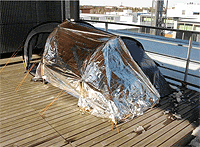Collaborative Networking (CoNe) group researchers got the best paper award at 2nd ACM Conference on Information-Centric Networking (ICN 2015)
Collaborative Networking (CoNe) group researchers got the best paper award at 2nd ACM Conference on Information-Centric Networking (ICN 2015), one of the most prestigious venues for ICN research. The article entitled Pro-Diluvian: Understanding Scoped-Flooding for Content Discovery in ICN is lead by Liang Wang - a recent PhD graduate from CoNe research group, and is the outcome of collaboration with Suzan Bayhan and Jussi Kangasharju from UH, Jörg Ott from Aalto University, Arjuna Sathiaseelan and Jon Crowcroft from Cambridge University.
ICN is a new networking paradigm with a promise to fix the mismatch between the host-centric design of the Internet and current information-centric use of the Internet. As users are interested in getting the information rather than who provides the information, ICN proposes to address the content, let the content move around in the network based on the user requests and network's resources, and facilitate host-to-content communications natively. This approach raises the challenge of locating the content in the network, for which scoped-flooding is assumed to work efficiently.
The article comprehends the scoped-flooding for content discovery in ICNs using random graph theory and shows that most of the gains of flooding come from the sparse area at the network edge where the neighborhood growth rate is low. This result provides a guide for how to search for content in an ICN, based on the network topology, router's location in the network as well as the requested content's availability in the network.

 Lots of energy can be saved by using outside air directly for cooling in data centers in the north. In a study by researchers of Helsinki Institute for Information Technology HIIT and the University of Helsinki, computers functioned correctly over extended periods of time when run in harsh winter temperatures. Commercial, off-the-shelf computers ran well even when the outside temperature was -22C (-8F).
Lots of energy can be saved by using outside air directly for cooling in data centers in the north. In a study by researchers of Helsinki Institute for Information Technology HIIT and the University of Helsinki, computers functioned correctly over extended periods of time when run in harsh winter temperatures. Commercial, off-the-shelf computers ran well even when the outside temperature was -22C (-8F).